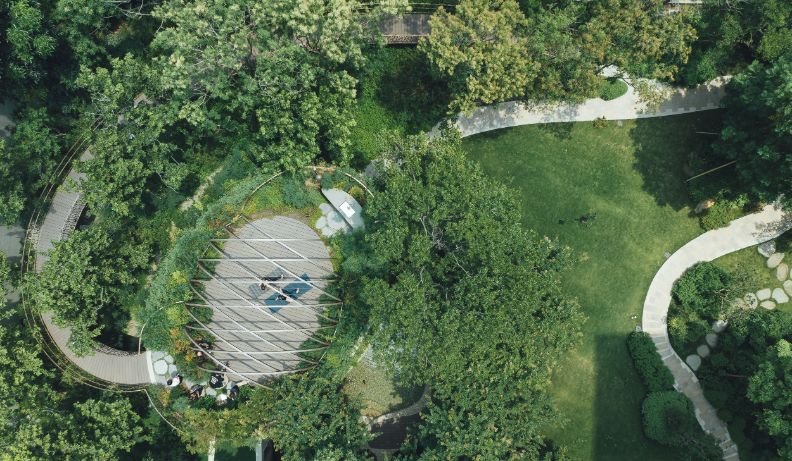A dialogue with the next generation about home buying values: Chang Lily of Treasure Dragon Construction shares her perspectives on home buying with the newly wealthy middle class.
Lily Chang|Global Views Monthly Interview

(Right) Chang Lily of Treasure Dragon Construction, (left) Jun Sheng, a representative of the new middle class
In his book "The End of Poverty," economist Jeffrey Sachs wrote, "Social stability and happiness come from people's satisfaction with a sense of security and belonging." And the most direct carrier of this need is the home. It is a shelter, a living space, and a medium for wealth inheritance.
Chang Lily, Presidentof Treasure Dragon Construction, a company deeply rooted in Taichung, joined the rising middle class in a discussion exploring their perspectives on homeownership. She offered insights from the industry, but also a touch of tenderness from a builder, to understand the anxieties of the middle class regarding homeownership.
As Taiwan's housing market faces a wait-and-see mood, the topic of home buying seems to revolve around questions like "affordability" and "will housing prices fall?" However, she raises a deeper question: "Should we rethink our understanding of home?"
Chang Lily observes that, regardless of market conditions, the number of people truly interested in buying a home never disappears. This is especially true for middle-class families, who aren't simply buying for size or location, but rather for the perceived stability of life. "So, for many, their first home is often the beginning of marriage, childbirth, or caring for parents."
A Generational Dialogue! Why do the middle class still want to buy a house? Life's turning points
The current housing market is becoming increasingly challenging for the middle class. This struggle has been experienced by generations. Fourth and fifth graders recall buying homes during a time when interest rates approached 10%, and with short repayment periods, many struggled to pay down principal and minimize interest. Meanwhile, the younger generation, while enjoying lower mortgage rates and 30-year repayment periods, faces higher housing prices and slower wage growth, making even saving for a down payment a significant obstacle. But one thing they share: a desire for a home of their own.
As a middle-class, urban worker in his 30s, Jun Sheng once hesitated: rent or buy? But after moving three times, missing out on several promising rentals, and having to resort to "teardown" renovations every time, he resolutely decided to buy a house. He finally understood what home really meant.
But saving money to buy a house is not easy. Jun Sheng chose to endure hardships first and then enjoy the sweetness. He suppressed his consumption desires to the minimum and worked day and night to make money. In his fourth year of working, he successfully saved NT$1 million and bought his first second-hand house on Wenxin Road in Beitun District, Taichung in 2017.
"Buying a home early in life is about stability. That moment isn't just about physical possession, it's about a sense of psychological certainty," Chang Lily echoes. She explains that while the home-buying stories of different generations may seem different in their circumstances, the underlying aspirations are the same: a desire for control over one's life, knowing they can have a quiet dinner there, invite friends over, and imagine who will live with them in the future. This sense of belonging and anticipation is something one never experienced before buying a home.
Chang Lily says many homebuyers don't necessarily care about "Will housing prices rise?" but rather "I want a place of my own." For most middle-class families, a home isn't just a starting point for asset allocation; it's a milestone in their lives, a promise for the future. Similar homebuying stories are common at Longbao Construction.

Staying true to our original aspiration and listening to the voices of residents has always been Treasure Dragon Construction's unwavering architectural belief.
The middle class's asset chips: Buying a house may be more about "seeking good quality than good quality."
However, from an asset perspective, buying a home is the starting point for personal financial stability. Jun Sheng purchased his first "starter home," and the monthly mortgage payments, exceeding tens of thousands of yuan, seemingly cut back on daily expenses, but became the most effective forced savings mechanism. Furthermore, he reevaluated financial considerations such as inflation protection, asset appreciation, future working capital, and a springboard for upgrading.
"After owning my first house, my financial management perspective has completely changed," Jun Sheng shared with Chang Lily, who nodded in agreement. "Yes, the mortgage is stressful, but it also allows you to shift your mindset from daily expenses to asset planning. Plus, you can see and touch a house, and when you live in it, you don't have to worry about market fluctuations or being stuck with it, because ultimately, it's the foundation of your life, not just a bargaining chip to be flipped."
Changing the subject, she suggested that young people entering the property market, in addition to weighing their income and doing what they can, should proceed according to the various stages of their life, keeping in mind the principles of "small for big", "old for new", and "far for near", etc., first strive for something and then strive for something better, or they can first purchase an old house and renovate it, taking into account both quality of life and financial pressure.
How the "Gendii Life" residential philosophy allows the newly wealthy middle class to experience the daily life and meticulousness of home
More important than financial assets is the emotional value of a home's space. Founded 36 years ago, Treasure Dragon Construction embraces the human-centric design philosophy of "Gendii Life." This philosophy doesn't necessarily focus on "large and abundant," but rather on creating "just the right amount" of space and a stronger emotional connection. This encompasses everything from layout, lighting, ventilation, and design of integrated cabinets, to landscaped patios and pioneering community forest cabins. All emphasize the "everyday feeling and meticulousness of home," earning it a prestigious reputation in the industry.
Chang Lily said, "We don't do flashy decorations, but want to build a place where people can live with peace of mind. The space is not cold lines, but a living scene that allows people to "live there and live for a long time."

Aerial shot of the gym house in the courtyard of Park Gendii in Wuri.
The United Nations promotes affordable housing. Chang Lily draws on international experience to offer advice: Governments are key.
Chang Lily, who will serve as president of the World Real Estate Federation FIABCI, shared international experience, noting that the United Nations has designated affordable housing as a fundamental human right. In addition to accelerating the construction of social housing, our government should also provide developers with more flexibility. For example, by setting floor space standards that can accommodate citizens and providing incentives to developers, we can shift the focus to returning living to its essence, reducing the need for community facilities, and allowing the public to make better use of public infrastructure.
She further explained, "In today's era of rising prices for raw materials such as land and construction, developers simply cannot launch affordable housing." The government should first upgrade the industry to reduce construction costs and solve the severe labor shortage and manpower gap to make the cost of building houses reasonable.
She cited Indonesia's housing policy as an example, noting that the country ensures affordable housing for its citizens through price caps and government-development partnerships. "Taiwan, on the other hand, isn't incapable of doing so, but rather is too accustomed to leaving issues to the government. To give the next generation a choice, institutional changes are necessary."

 MENUCLOSE
MENUCLOSE